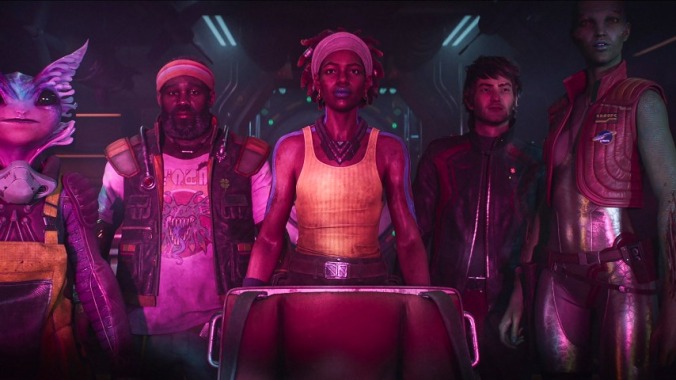Prime Video’s Anthology Series Secret Level Could Have Used a Few Extra Lives
Photo courtesy of Prime Video
Episodic anthology series are a tough nut to crack; they have to endear us to a cast of characters in record time, ideally while uniting their one-offs under a common theme. Tim Miller and Blur Studios previously did just that with their sci-fi series Love, Death & Robots, which left an impression thanks to its boisterous animation and provocative turns.
Miller and Blur’s latest project, Secret Level, has some similarities to their previous work in that it’s also an adult animated anthology series defined by explosions of violence. But in this case, instead of realizing original worlds, each of these 8-18 minute episodes is set in a different gaming series. Some of them are household names, like Pac-man or Dungeon & Dragons, while others will have even diehards scratching their heads, like Exodus, an unreleased “AAA science fiction action-adventure role-playing game.” Unfortunately, that’s not the only difference: weak writing and an overly uniform art style make the studio’s latest seem more like a collection of videogame advertisements than a compelling lineup of short stories. There are a few gems across its 15 episodes, but by and large, they fail to upgrade their source code.
A central issue for many of these adventures is that they feel constrained by the games they adapt. A good example is the first episode of the bunch, “Dungeons & Dragons: The Queen’s Cradle,” which offers the kind of boilerplate quest you’d expect as a freebie in the latest D&D rulebook. Its uninteresting cast and bland heroics fall flat, especially next to this franchise’s far more creative and surprisingly hilarious recent film adaptation, Dungeons & Dragons: Honor Among Thieves. Both “The Queen’s Cradle” and the Blue Bomber-centric episode, “Mega Man: Start,” play things exceedingly straight and end on a cut to black that makes them come across like the opening cinematic of a videogame instead of a self-contained journey.
Beyond these well-known games, quite a few of these shorts adapt series that are strange choices outside the context of marketing synergies. For instance, one episode is dedicated to Amazon’s MMO New World (Secret Level was produced by Amazon for Prime Video), a game that had a sizable player base when it first came out but didn’t leave much broader cultural impact. Additionally, there’s an episode that adapts Crossfire, a somewhat blasé military FPS that’s super popular in South Korea, while another is from Honor of Kings, a MOBA set in a relatively generic fantasy world that logged over 100 million players in China. In short, it feels like these inclusions were made primarily for business reasons instead of artistic ones. While any premise can be elevated given the proper execution—after all, Arcane is based on League of Legends, of all things—these specific episodes fail to distinguish themselves from the broad genre trappings that define their games, as evidenced by barely characterized gun-toting mercs and generic demons.
The Sony-backed episodes don’t fare much better. One is centered on Concord, a fiscal bomb that the company already pulled the plug on, and it does little to beat that game’s “knock-off Guardian of the Galaxy” reputation with its predictable band of misfits who spew flat Whedon-esque one-liners. And then there’s the single worst episode of the bunch, the fan-service fest “Playtime: Fulfillment,” a nonstop assault of PlayStation character cameos that fails to offer anything meaningful.
If there’s an overarching issue to many of the least interesting installments, it’s that they lack any real nuance, acting as a reminder of how uninteresting some videogame stories are once you’ve stripped them away from their gameplay loops. While it’s inherently difficult to establish much beyond broad strokes within such limited runtimes, that doesn’t forgive the fact that most of these episodes do little more than relentlessly hammer home one emotional wavelength over and over again, whether that means being intensely sentimental, like with “New World: The Once and Future King” and its unearned, mawkish conclusion, or if that means committing towards total dreariness.
Mercifully, though, this one-note approach works for some of the more over-the-top shorts, and a few range from audaciously bizarre to genuinely good. As for the former case, the most uncompromisingly bonkers episode is “Pac-Man: Circle,” which is so gory, alien, and unwaveringly self-serious that it loops around from bad to good again. While the trend of taking a relatively kid-friendly mascot and making it “dark” is usually entirely asinine, this implementation of that formula at least feels depraved in a fairly imaginative way.
-

-

-



